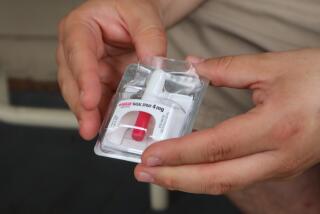Editorial: It’s way too soon to declare Tylenol a carcinogenic killer
- Share via
State regulators are contemplating adding Tylenol and other medications containing acetaminophen to the state’s ever-growing list of chemicals suspected of causing cancer, and requiring that consumers be warned of its potential risk.
But hold on before you toss out your Tylenol, Theraflu, Vicodin and any number of other prescription and over-the-counter drugs that might include acetaminophen, the popular pain relieving ingredient. The fact that the California Office of Environmental Health Hazard Assessment may end up slapping the drug with a warning label doesn’t mean it’s a proven killer.
In fact, the science on acetaminophen is far from settled. There have been more than 100 studies examining its carcinogenicity. Some have found that people who use the drug also had a heightened risk of liver, bladder and blood cancer. Others found no increased risk. Those suggest there may be a problem, certainly, but don’t prove one because so many other substances may be a factor. The loose connection is the reason the International Agency for Research on Cancer, which is part of the World Health Organization, does not categorize acetaminophen as a human carcinogen.
But California’s 34-year-old Proposition 65 doesn’t need a smoking gun. And that’s the ongoing problem with the well-meaning but fundamentally flawed law that was intended to alert Californians when they encountered real cancer and reproductive threats. The standards for inclusion on the Proposition 65 list are so low that there are about 900 chemicals on it (including aspirin, it turns out, which may do harm to pregnant users). This in turn has spawned so many warning signs in public places and on products that they have become a forgettable part of the local landscape.
The law hit its absurd nadir two years ago when regulators had to exempt coffee from the law’s mandates. Because coffee contains acrylamide, which is known to cause cancer by itself, Proposition 65 would have required every cafe, coffeehouse and restaurant in the state to post a cancer warning sign even though there is no proof that coffee is dangerous, even with acrylamide present. In fact, studies have found more health benefits to coffee drinking than risks.
At the moment, state officials are accepting comments on the proposed rule before it goes to the Carcinogen Identification Committee for a listing decision this spring. Here’s our contribution: It’s way too soon to declare acetaminophen as a carcinogenic killer.
More to Read
A cure for the common opinion
Get thought-provoking perspectives with our weekly newsletter.
You may occasionally receive promotional content from the Los Angeles Times.










